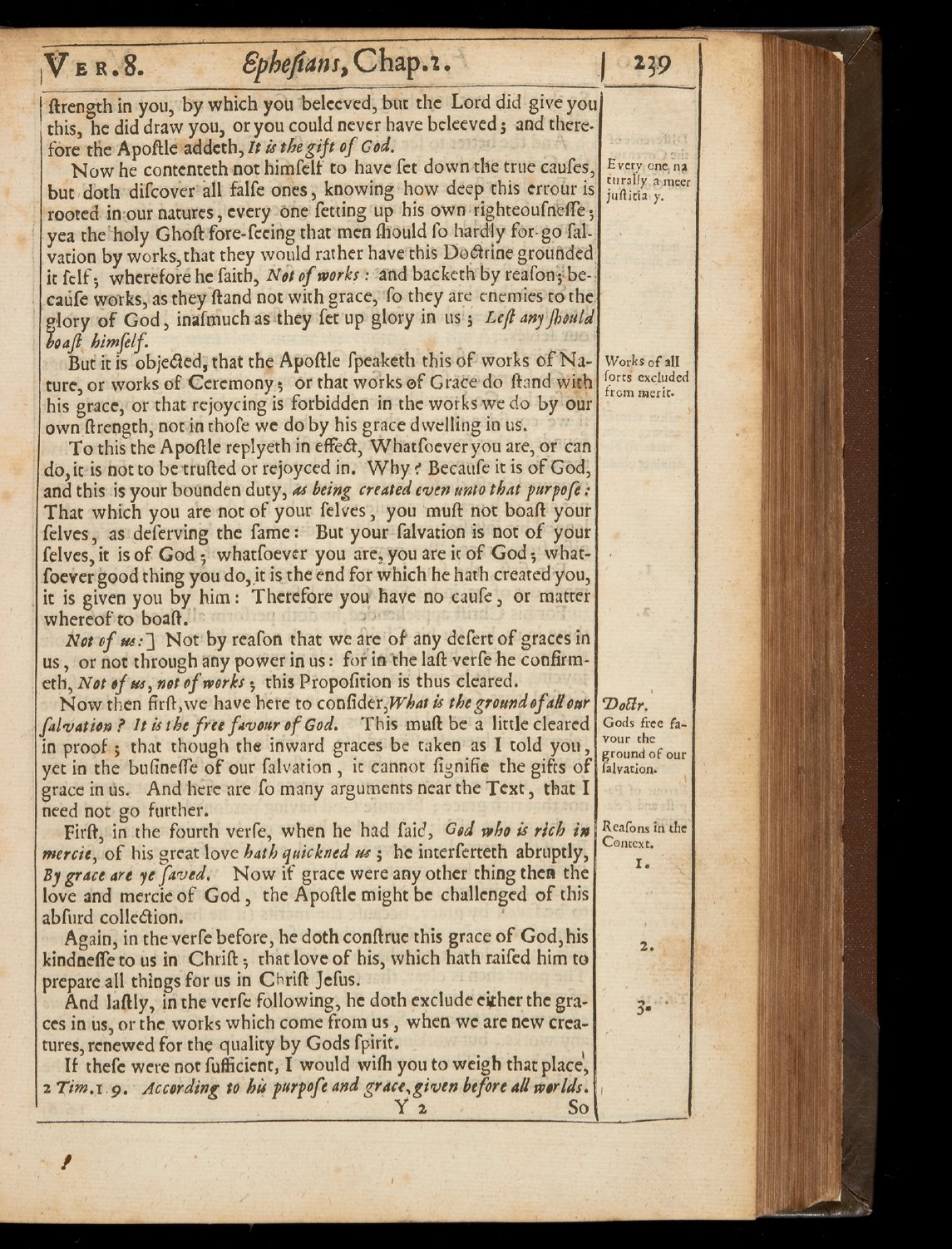

E
R
.
8.
é'phejan.r,
Chap.2.
23.9
ftrength
in
you,
by which
you belccved,
but the Lord
did
give you
this, he
did draw
you, or
you could never have
bcleeved;
and there-
fore
the Apoftle addeth,
is
the
gift of
God.
Now
he
contenteth
not
himfelf to
have
fet
down the true
caufes,
but doth
difcover all
falfe
ones,
knowing how deep this errour
is
rooted
in
our
natures,
every one letting
up his
own righteoufnefle;
yea the holy Ghof't fore-
feeing
that
men fhould
fo
hardly
for-go
fal-
vation
by works,that they would rather
have this
llooìrine
grounded
it
felf;
wherefore
he
faith,
Not
of
works
:
and
backcth by
reafon
be-
caúfe
works,
as
they (land not with grace,
fo
they
are
enemies
to
the
.
glory
of
God,
inafmuch as
they
feu
up
glory
in
us ;
Left
any
fhould
baulk
himfelf.
But
it is
objected,
that the
Apoftle fpeaketh this
of
works
of
Na-
ture, or
works
of Ceremony; or
that works
of
Grace do (land with
his grace,
or that rejoycing
is
forbidden
in
the works
we
do
by our
own
ftrength, not
in
thofe
we
do
by
his
grace dwelling
in
us.
To
this
the Apoftle
replyeth
in
effeél,
Whatfoever
you are,
or
can
do,
it
is
not to betrufted
or rejoyced
in.
Why
e
Becaufe
it
is
of
God,
and this
is
your bounden duty,
as being
created even
unto
that
purpofe:
That
which you
are
not
of
your
felves,
you
mull
not
boaft
your
felves,
as
deferving
the fame:
But
your
falvation
is
not
of
your
felves,
it
is
of
God
;
whatfoever you
are, you are
it
of
God
;
what
-
foever good
thing you do,
it
is
the
end
for which
he
hath created you,
it
is
given you
by
him:
Therefore
you have no
caule,
or matter
whereof to
boafl.
Not
of
us:
]
Not
by reafon
that
we
are
of
any
defert
of
graces
in
us,
or not through
any
power
in
us:
for
in
the
laft verle he confirm
-
eth,
Na
of us,
not
of
works ;
this Propofition
is
thus cleared.
Now
then firft,we have here to confider,What
is
theground
ofalour
falvation
?
It
is
the
free favour of
God.
This mull
be
a
little cleared
in
proof
;
that though the
inward graces be taken
as
I
told
you,
yet
in
the
bufineffe
of
our falvation
,
it
cannot
fignilie
the
gifts
of
grace
in us.
And
here are
fo
many arguments near the
Text,
that
I
need
not go further.
Firfl,
in
the fourth verle, when he had
fail,
God who
is
rich in
mercie,
of
his
great love bath
quickned
ue
;
he interferteth abruptly,
By
grace are
ye
Paved.
Now
if
grace were any other
thing then the
love and mercie
of
God
,
the Apoftle might be challenged
of
this
abfttrd
collection.
Again,
in
the verle before,
he
doth confirm
this grace
of
God,his
kindneffe
to
us
in
Chrift
;
that
love
of
his,
which hath
raifed
him to
prepare all things for
us in
Chrifl
Jefus.
And
laftly,
in
the
verfe
following,
he
doth exclude eitherthe gra-
ces
in us,
or
the works which come from
us
,
when
we
are new crea-
tures, renewed for
the
quality
by Gods
fpirit.
If
thefe were
not
fufficient,
I would with you
to
weigh
that
place,
zTim.r.g,
According
to
hù
purpofe and
grace,given
before
all
worlds.
Y
z
So
E
very ene
na
rurally
a
meet
juiliria
y.
Works
of
211
forts
excluded
from merit.
D,Efr.
Gods free
fa-
vour
the
ground
of
our
falvation.
Reafons
in
the
Context.
2.
3
l

















